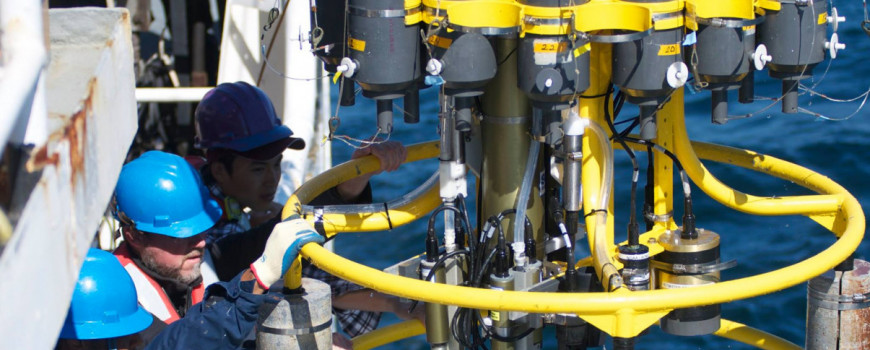California Sea Grant and the California Ocean Protection Council (OPC) have selected three projects to receive funding to improve understanding of ocean acidification and hypoxia (OAH) in California’s coastal ocean. The projects were selected to address OAH research, monitoring, and synthesis priorities that will ultimately provide state resource management agencies and local jurisdictions with data necessary to protect marine biodiversity and water quality, advance coastal adaptation efforts, and support climate-ready fisheries.
The funded research projects will last three years and will collectively receive $2.5 million in funding from the OPC’s Prop 68 and California Sea Grant’s NOAA Sea Grant funds. The research projects were selected through a competitive process based on criteria developed by the OPC and California Sea Grant, in coordination with the State Water Resources Control Board. California Sea Grant facilitated the proposal solicitation, review panel process, and will administer the project grants.
Ocean acidification and hypoxia trigger a wide range of ecosystem impacts and often co-occur, creating a management challenge for the West Coast region. As a consequence of increased global carbon dioxide emissions and nutrient loading, ocean acidification disproportionately impacts sensitive species, especially those that rely on calcium, many of which support important commercial fisheries and food webs in California and beyond.
“These projects align with both California Sea Grant and the Ocean Protection Council’s research priorities, and will help fill knowledge gaps and will ultimately contribute to improved management,” says California Sea Grant Director Shauna Oh.
The funded projects will address California Sea Grant’s strategic focus areas that support healthy coastal ecosystems and sustainable fisheries, and OPC’s strategic plan objectives to minimize causes and impacts to ocean acidification and hypoxia and improve understanding of climate impacts on California’s coast and ocean.
Ocean Acidification and Hypoxia Funded Research Projects
Assessing the potential for rapid adaptation to climate change in rockfish
Project Number: R/HCEOPC-30
PI: Cheryl Logan, CSU Monterey Bay
CoPI: Scott Hamilton, Moss Landing Marine Labs, San Jose State University
CoPI: Giacomo Bernardi, UC Santa Cruz
CoPI: John Field, Southwest Fisheries Science Center, NOAA
Advancing OAH science off northern California: a critical expansion of monitoring and research to quantify OAH exposure, assess ecosystem impacts, and support model development
Project Number: R/HCEOPC-31
PI: Jeffrey Abell, Humboldt State University
CoPI: Eric Bjorkstedt, Humboldt State University, Southwest Fisheries Science Center, NOAA
CoPI: Tamara Barriquand, Humboldt State University
CoPI: Alex Harper, Monterey Bay Aquarium Research Institute
A California OAH Portal to enable synthesis and understanding of state-wide status and trends
Project Number: R/HCEOPC-32
PI: Alex Harper, Monterey Bay Aquarium Research Institute
CoPI: Henry Ruhl, Monterey Bay Aquarium Research Institute
CoPI: Robert Bochenek, Axiom Data Science
CoPI: Faycal Kessouri, Southern Coastal Water Research Project Authority
CoPI: Clarissa Anderson, Scripps Institute of Oceanography
CoPI: Erin Satterthwaite, California Sea Grant, Scripps Institute of Oceanography
CoPI: Jan Newton, University of Washington
CoPI: Roxanne Carini, University of Washington
###
About The Ocean Protection Council
As a Cabinet-level state policy body nested within the California Natural Resources Agency, OPC advances the Governor’s priorities for coastal and ocean policy and works broadly to advance healthy coastal and ocean ecosystems for current and future generations. OPC’s mission is to protect California’s coast and ocean by advancing innovative, science-based policy and management, making strategic investments, and catalyzing action through partnerships and collaboration.

